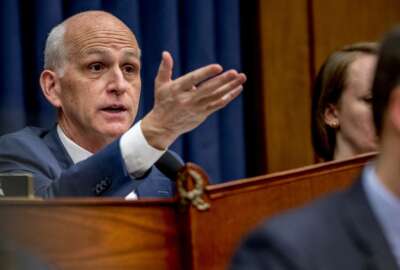Federal employees score new bereavement leave benefits in 2022 NDAA
The new defense policy bill doesn't include quite as many sweeping changes for the broader civilian federal workforce as recent catch-all authorizations have. But...
After weeks of negotiations over a compromise agreement, the 2022 National Defense Authorization Act might just be known for what didn’t make the cut.
The House passed the final NDAA agreement Tuesday night, and the Senate is expected to follow suit in the coming days. The final agreement didn’t include cyber incident reporting requirements, major updates to the Selective Service or the full scope of changes to the military justice system as originally envisioned by a bipartisan group of congressional members.
Federal employees have scored significant benefits through recent defense policy bills. The 2020 NDAA brought most federal workers paid parental leave for the first time, and the 2021 authorization expanded those benefits to the rest of the workforce.
Federal employees won’t find proposals on that scale in the final 2022 bill. And in fact, a good number of federal workforce and oversight provisions are gone from the final agreement.
A provision making a digital, real-time version of the Plum Book — a list of political appointees published by congressional oversight committees once every four years — didn’t make the cut.
Housing stipends and mental health programs for federal wildland firefighters are gone from the final version too. The bill does include a provision ensuring federal firefighters who trade shifts across multiple pay periods aren’t subject to pay decreases or overtime limitations.
The recently-passed Infrastructure Investment and Jobs Act also included some new benefits for these employees.
A proposal that would have created a new digital corps reserve program inside the General Services Administration didn’t make the final bill, either.
Nonetheless, there are a few notable workforce provisions that did make the cut. Here are few highlights.
Bereavement leave for federal employees
The 2022 NDAA requires two weeks of paid bereavement leave for federal employees, perhaps the most tangible new benefit for workers in this year’s sweeping defense bill.
Specifically, the bill provides for up to two weeks of paid time off within a 12-month period if an employee experiences the death of a child.
The House included a similar bipartisan proposal in its version of the 2022 NDAA, which negotiators agreed to include in the final version.
A separate provision clarifies that civilian federal employees who also serve as members of the District of Columbia National Guard are entitled to leave during their mobilization — without losing pay or time.
Del. Eleanor Holmes Norton (D-DC) and Rep. Don Beyer (D-Va.) were the main architects behind this proposal, which they said was meant to correct a longstanding, highly specific error.
Two-year probationary period for defense employees is gone
After a few years of debate on the topic, House Democrats successfully repealed the two-year probationary period for civilian employees at the Defense Department.
The change applies to defense employees hired on or after Dec. 31, 2022, according to the bill.
Currently, new hires at DoD must spend two years successfully working at the department until they can, for example, access their rights to appeal a disciplinary action with the Merit Systems Protection Board. All other federal employees are subject to a one-year probationary period.
In an effort to perhaps test the concept of a longer trial period for the federal workforce, Congress adopted a two-year probationary period for DoD civilian employees in the 2016 NDAA.
Since then, House Democrats have made multiple, but unsuccessful, attempts to change it back. As a form of compromise, Congress in 2020 authorized an external study of the effects and impacts of the two-year probationary period for DoD civilian employees, including a demographic analysis of those who were fired before completing their trial period at the department.
That study is incomplete, but the results might not matter.
Federal employee groups, meanwhile, are mixed on the topic. The American Federation of Government Employees has said eliminating the two-year probationary period was one of its top priorities, and it applauded the repeal in a statement Wednesday.
The Federal Managers Association, however, disagrees. It supports the overall NDAA but said Congress is jumping the gun in repealing the two-year probationary period before it has a chance to review findings from the 2020 study.
“We urged Congress to not take premature action and to wait until it could make an evidence-based decision using actual data,” FMA National President Craig Carter said Wednesday in a statement. “Acting now makes zero sense. We expect the results of the study to be submitted to Congress in the coming weeks or months. In the spirit of the Biden administration’s promise in the President’s Management Agenda to be guided by science and data on these decisions, we urge Congress to reconsider a two-year probationary period in the fiscal 2023 NDAA if the data supports it.”
New digital service occupational series
The 2022 NDAA doesn’t skimp on the requests for agency studies and projects.
Congress, for example, wants the Office of Personnel Management to create or update one or more occupational series to reflect software development, software engineering, data science and data management. The provision stems from a recommendation from the National Security Commission on Artificial Intelligence.
OPM has already been working on a new data science occupational series, a collaborative effort with the agency and the Chief Information Officers Council.
The bill also directs the Chief Human Capital Officers Council to submit an annual report to Congress on its activities, particularly those focused on improving federal hiring.
New DHS employee engagement initiatives
The 2022 NDAA includes several provisions for the Department of Homeland Security, and they mirror some of the proposals from a sweeping bill House Democrats introduced earlier this year.
The 2022 NDAA, for example, will require that DHS form an employee engagement steering committee with members from the department’s subcomponents, labor organizations and field and headquarters employees. The group, led by the DHS undersecretary for management, will identify factors that lead to poor employee engagement and will develop plans and initiatives to improve them. The bill requires a DHS-wide employee engagement action plan, plus action plans from each of the department’s subcomponents.
The NDAA also sets new requirements for the DHS chief human capital officer. The CHCO is now responsible for creating a learning agenda for the DHS workforce, approving component-level engagement plans and maintaining a catalog of available professional development opportunities for the department’s employees, according to the 2022 legislation.
In addition, the 2022 NDAA calls for a Government Accountability Office study on DHS’ handling of employee misconduct, as well as a Transportation Security Administration-led survey of its workforce on the agency’s COVID-19 response. The survey should solicit feedback from employees about TSA’s communication with the workforce, the availability of personal protective equipment for transportation security officers, the agency’s schedule and telework flexibilities and its vaccination campaign.
Copyright © 2025 Federal News Network. All rights reserved. This website is not intended for users located within the European Economic Area.
Nicole Ogrysko is a reporter for Federal News Network focusing on the federal workforce and federal pay and benefits.
Follow @nogryskoWFED






